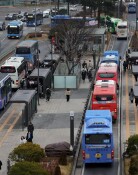The Original Sejong City Plan
A revision bill on revising the planned relocation of key government offices from Seoul to Sejong City in South Chungcheong Province was rejected by parliament Tuesday. With 275 of 291 incumbent lawmakers attending, the bill was rejected by a 164-105 vote with six abstentions. Almost all opposition lawmakers voted against the bill and certain ones from the ruling party either rejected it or abstained from voting. The bill will remain a historical record in light of being struck down.
The decision by parliament and lawmakers must be respected. Regardless of the voting results, however, the original plan to disperse government agencies is ill-conceived. In this sense, lawmakers also made the incorrect decision of striking down the revised bill, which aimed to rectify wrongs. Along with lawmakers who voted for the bill, those who voted against should take political and historical responsibility. Some opposed the vote itself but to not put a major bill like this to a parliamentary vote is not responsible politics.
The original Sejong City plan to relocate 13 government agencies, including the Office of the Prime Minister and economy-related ministries, is nothing less than a political strategy to secure votes in the Chungcheong provinces. In substance, the original plan is another form of relocating the capital. Political interest might be a high priority for politicians, but the burden of relocating government agencies will ultimately be shouldered by the people. Regionalism can bring immediate benefits, but as seen by the "Sejong City incident," it will result in tremendous losses to regions and the nation. The original plan to build a government agency-centered city will not contribute to more balanced regional growth.
The original plan also has no precedent in the world. It is simply inefficient to have the capital with the presidential office and an administrative city with the prime ministers office in a territory equal to the size of a U.S. state and a Chinese province. If ministers stay in Seoul to attend the National Assembly and meetings at the presidential office, their offices in Sejong City will remain vacant. If there is no choice but to follow the original plan, the government must strive to minimize confusion and waste stemming from the relocation of state agencies.







